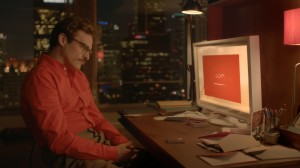film review: her
It is so much easier to write film reviews for movies you instantly love or hate. For me, Spike Jonze’s latest film Her provoked the former feeling – I absolutely adored this film. It was full of quotes and observations that were so beautifully phrased that I wanted to lean across to my fellow moviegoer and say, “Oh God, I so get where they’re coming from.” My favourite example of this comes from Samantha, the electronic lady love of the film, musing about previous experiences informing current perceptions depending on how we remember them: ‘The past is just a story we tell ourselves’.
Her opens somewhere in the not-too-distant-future (technology has progressed along believable lines and the world is still recognisable) as Theodore, played by Joaquin Phoenix, crafts love letters for a living: for spouses, friends, family members. Theodore has the gift of articulating feelings of grief, gratitude, and love more than the people experiencing them. Outside of work he is as hapless and inhibited as any other person, perhaps even more so, as he is on the tail end of a divorce.
This film deftly explores themes surrounding love, intimacy and loneliness. There is a particularly stark and evocative scene in the beginning of the film; we see Theodore walking from work to home surrounded by people and yet completely alone. This may seem obvious, even trite, yet I found it encompassed the universal notion that it does not matter how densely populated a place is, one can at any time feel alone.
After a a few laugh out loud moments of watching Theodore try to get what he is craving by dabbling in online dating, he downloads an Operating System that is both intelligent and has the capacity to evolve. The audience is made immediately aware of this during Theodore’s first conversation with her – he asks for her name and she pauses for a second and then replies ‘Samantha’. We discover that during her hesitation, she read thousands of baby name books and decided Samantha was her favourite. Samantha is inhumanely fast and also has personality.
At this moment I felt concerned that I was going to have to sit through a film about a man who falls in love with a computer program because she bends effortlessly to his will. I was pleasantly surprised when not only did Samantha display a desire to become more than the sum of her parts, but she pointed out to Theodore during their romance when he erred and treated her badly. Samantha was supportive and healing; she helped nurse Theodore back to a functional human being without compromising her own desires.
This film, like so many others, does not pass the Bechdel test. For anyone not familiar, the test consists of three rules, applied to all films to see if they pass as ‘feminist’:
1) there have to be at least 2 main female characters
2) they have to have a scene all to themselves
3) They have to have a conversation and that conversation cannot involve men.
Her‘s failing Bechdel grade does not bother me as much as it normally would. Partly because it it didn’t have tonnes of scenes with just men talking to men about men stuff. Most of the scenes involved one man talking to a computer with a female voice on topics that were relateable to both sexes. Having said that, I did feel that tiny inward sigh I have with a lot of popular culture – sometimes you have to suspend your sense of feminism otherwise you’ll enjoy very few things. Fortunately, this film is not a sexist one by any means and is brimming with vivacity and insight.
The big question that Her provokes is ‘can someone actually fall in love with artificial intelligence? Is it “real?”’ and ultimately, the answer the film delivers is ‘as long as it makes you happy, who the fuck cares?’
I pondered this as I left the cinema. Is it good to find love and intimacy, things that humans need innately, in a computer program rather than from another human being? But then the more pertinent question is, ‘Why is this happening the first place?’ If we can’t find connection to our own species, then we will find it either purposefully or unwittingly somewhere else. To me it seemed logical that Theodore would fall in love with an unpredictable and passionate program that knew him intimately, like an organic being.
Another beautiful quote from this film sums this up perfectly:
‘I’ve just come to realize that we’re only here briefly. And while I’m here, I wanna allow myself joy. So fuck it.’
Happiness can come from weird and unexpected places. Don’t over analyse it – just put it in the win column and go with it.


